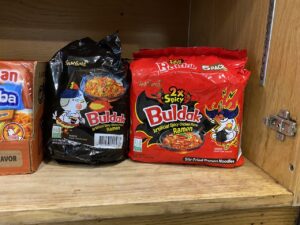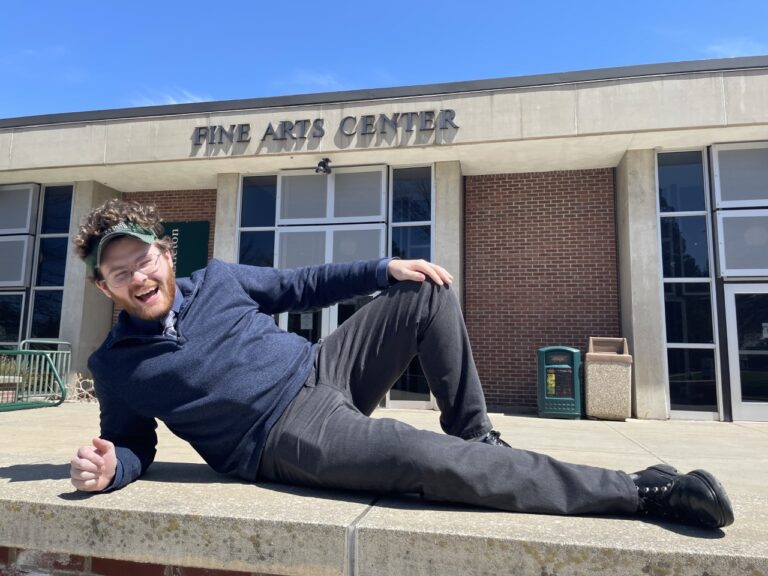A taste of home for international students

Packed in beside the Doritos, granola bars, and cans of soup that fill the shelves in Fireside are snacks and packages with branding that is unfamiliar to most of the students at Castleton.
Ramen with a “2x Spicy” warning label, dried seaweed snacks and panda shaped crackers filled with chocolate.
While some of these items might be unknown and go unnoticed to most American students, they can mean a lot when an international student walks into Fireside and see snacks that remind them of their home country.
Kanon Arakawa, who is from Japan, mentioned those panda shaped crackers, from the brand Meiji, as one of her favorite snacks in Fireside.
“American chocolate is, kind of, sweeter than Japanese,” Arakawa said.
And it goes beyond just the chocolate.
“I found potato chips, Japanese potato chips, and it’s hard to buy in America, but I can get it at Fireside,” Arakawa said excitedly, adding that seeing these snacks at Castleton makes her “feel comfortable and nostalgic.”
Jim Stewart, who has run Fireside for three years but has worked at Castleton for 11, sees the impact it can have to provide students with food from home.
“It’s like a part of home, you know, so when somebody walks in, they see it and it’s like, ‘oh my god, home is here.’ And it kind of makes them feel comfortable,” Stewart said.
Stewart noted that working in Fireside has opened his eyes to how important this is for students. He even goes as far as showing the food catalog to international students when they come in and ordering things at their request.
One of the first times he did this was during a summer program when students from Asia were on campus.
“As soon as they saw [the catalog], they said ‘can you get this, can you get this?’ You know, they were excited,” Stewart said.
Ikay Ekeji, an international student from Nigeria, spoke about how difficult it can be to find food from home in the Castleton area.
“There are so many kinds of food I miss from home. I think, being here, even going to Rutland and all that, I haven’t seen the food I might get back home,” Ekeji said. “The idea of just trying to be more inclusive in terms of food offerings at Fireside I think is really, really helpful.”
Food may not be the first thing that comes to mind when thinking of the difficulties international students may face.
Aurooba Shafquat, from Pakistan, didn’t think about packing food or snacks to bring with her, and, regretfully, didn’t pack any spices either.
“If anybody’s traveling internationally, food is an essential and, especially if you’re South Asian or Southeast Asian, we eat spicy food. Just keep your spices with you and you’ll be fine,” Shafquat said with a laugh.
But for Shafquat, and other Muslim students, another level of difficulty is placed on finding food to eat, as halal meat is hard to find in this area.
“Honestly, it’s super difficult. I’m surviving for the whole, like, four months I’m here, on the vegetable corner [in Huden],” Shafquat said. “Even in Rutland they don’t have any halal meat.”
Rob Macfarlane, who runs Huden, has done his best to help with that by special ordering Halal chicken and preparing it for Muslim students.
Adrienne Matunas, who mainly provides English language support for international students, but works with them very closely, expressed her appreciation for Macfarlane’s efforts.
“Rob and the Huden team have been doing a great job to offer that for students because halal meat is very hard to come by in Vermont. They really can’t get it on their own outside of, you know, Rob being able to bring that in,” Matunas said.
Unfortunately, though, due to budget and staff limitations, this is not something that Macfarlane can do on a wider scale, so the options for Muslim students are still slightly limited.
“Quite frankly, it’s more expensive. It’s not quite double, but it is a lot more, so we don’t have the ability budget-wise to put Halal chicken out so everybody can take it,” Macfarlane said.
And because it has to be prepared separately, the Huden staff doesn’t always have the ability to prepare it in special ways.
“Every single day or every other day we take it and we poach it just in some wine, celery and onions and it’s just very, very simple. And when we can, if we’re not busy, they’ve been known to take some of that chicken and dice it up and fry it for them. But it’s just not something that we can do every day, I just don’t have the staff,” Macfarlane said.
Shafquat still expressed her gratitude.
“I know that it’s hard, but I do appreciate what they have done for us this semester. I’m so grateful to them,” Shafquat said.
And Macfarlane does try – in the past he’s gotten sausage from Sweden, pickled herring for Scandinavian students, made curried goat with jollof rice for students from Africa and, with some students’ help, deep-fried a whole red snapper.
“If a student comes to us, and it’s something that we can do, I think I’d be remiss to not at least try,” Macfarlane said.
Stewart feels the same way about Fireside, and both Stewart and Macfarlane stressed that students can come with requests, and they will do their best to fulfil them. Food can mean more than just food, especially to international students who may be feeling homesick, and they recognize this.
“It’s a long ways from home. I think it depends on the individual, what makes them feel better. And if that’s all it takes, it’s a home run,” Stewart said.







